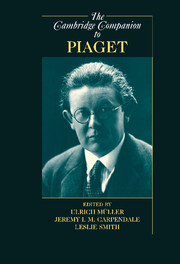Book contents
- Frontmatter
- 1 Introduction: Overview
- 2 The Historical Context Of Piaget’s Ideas
- 3 Piaget’s Developmental Epistemology
- 4 Piaget’s Biology
- 5 On the Concept(s) of the Social in Piaget
- 6 Piaget on Equilibration
- 7 Constructive Processes: Abstraction, Generalization, and Dialectics
- 8 Piaget and Method
- 9 Infancy
- 10 Childhood
- 11 Adolescence
- 12 Piaget’s Theory of Moral Development
- 13 Piaget’s Enduring Contribution to a Science of Consciousness
- 14 Piaget and Affectivity
- 15 Piaget’s Pedagogy
- 16 Piaget in the United States, 1925-1971
- 17 The Mind’s Staircase Revised
- 18 Dynamic Development: A Neo-Piagetian Approach
- Index
14 - Piaget and Affectivity
Published online by Cambridge University Press: 28 March 2010
- Frontmatter
- 1 Introduction: Overview
- 2 The Historical Context Of Piaget’s Ideas
- 3 Piaget’s Developmental Epistemology
- 4 Piaget’s Biology
- 5 On the Concept(s) of the Social in Piaget
- 6 Piaget on Equilibration
- 7 Constructive Processes: Abstraction, Generalization, and Dialectics
- 8 Piaget and Method
- 9 Infancy
- 10 Childhood
- 11 Adolescence
- 12 Piaget’s Theory of Moral Development
- 13 Piaget’s Enduring Contribution to a Science of Consciousness
- 14 Piaget and Affectivity
- 15 Piaget’s Pedagogy
- 16 Piaget in the United States, 1925-1971
- 17 The Mind’s Staircase Revised
- 18 Dynamic Development: A Neo-Piagetian Approach
- Index
Summary
Despite various attempts to adjust the current “received view” of Piaget's theory (e.g., Bearison & Zimiles, 1986; Carpendale & Lewis, 2004; Chapman, 1988; Gouin-Décarie, 1965; Lapsley, 1996; Xypas, 2001), the general impression that Piaget really had nothing substantive to contribute regarding the development of children's affective lives pervades much of contemporary psychology. Piaget, at least as most of us know him, is the “cold cognitivist,” whose affinities with Kant's rationalism led him to eschew all things affective or emotional. Much like Piaget's contributions to sociology (Carpendale & Lewis, 2004; Piaget, 1965/1995), his work on affectivity and emotions is largely forgotten, despite his various attempts to note the significance of individuals' affective lives in several of his major publications.
Dispelling this impression, or at least naïve versions of it, will be a central aim of this chapter. In doing so, we plan to revisit Piaget's lectures at the Sorbonne (1953-1954), published in the journal Bulletin de Psychologie (Piaget, 1954) and later translated as Intelligence and Affectivity (Piaget, 1954/1981), as well as his lectures at the Menninger Clinic in the United States (Piaget, 1962a, 1962b).
- Type
- Chapter
- Information
- The Cambridge Companion to Piaget , pp. 309 - 323Publisher: Cambridge University PressPrint publication year: 2009
- 10
- Cited by

